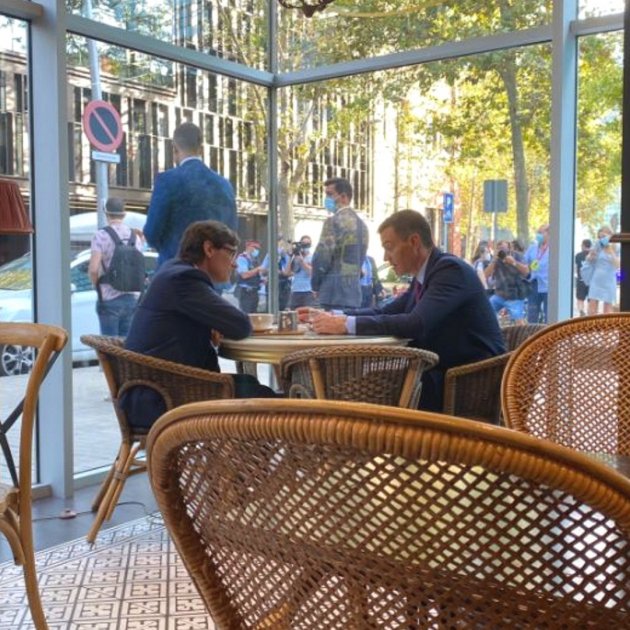The Spanish prime minister, Pedro Sánchez, went off to have a coffee with his Socialist colleague Salvador Illa while the dialogue table on the political conflict with Catalonia was meeting at the Generalitat palace in Barcelona. After days of reluctance by the Spanish leader to state whether he himself would take part in the much-awaited dialogue table meeting, the Spanish delegation at the table finally consisted of Félix Bolaños, Yolanda Díaz, Miquel Iceta and Isabel Rodríguez, with Laura Vilagrà and Roger Torrent on the Catalan side. Sánchez and the Catalan president, Pere Aragonès, only went to the table to greet the two delegations, after the two leaders had held a preliminary meeting.
After appearing at a press conference, and before Aragonès did so, Pedro Sánchez left the Generalitat palace while the dialogue table was in session and was driven to the El Fornet café on Carrer Pallars, where he chatted with Salvador Illa, leader of the Catalan Socialists (PSC). Radio journalist Cesc Giró published several photographs of the moment.
The conversation between Sánchez and Illa lasted 15 minutes. Sánchez took a café con hielo, iced coffee, and Illa, assuming he ordered in Catalan, would have asked for a cafè amb llet, coffee with milk.
In his press conference, Sánchez presented two key ideas: the positions of the sides are "very distant" and the dialogue table must work "with no haste, but no hold-ups". After meeting for almost two hours with Catalan president Pere Aragonès in this preliminary meeting to the dialogue table session, the Spanish PM once again certified his firm 'no' to the two main proposals of the Catalan delegation: a referendum on self-determination, and a law to grant an amnesty to all those facing judicial and police action over the independence process.
Spanish PM, Pedro Sánchez, and Catalan Socialist party leader, Salvador Illa, in a café in Barcelona | Cesc Giró
In his press conference after this meeting, the Spanish prime minister sought to warn, despite the cordial greetings, that the "positions are very distant" and that this will take time. "We are reaching sectoral agreements in many areas, but we have very different positions on how to resolve this crisis," said the Socialist leader. "Neither the referendum nor the amnesty are possible," he said, adding that "the prime minister will always respect democratic legality and the constitutional order." He went further and warned that "whatever Spain is, all Spaniards will have to decide, not just a part".
In the face of this, Sánchez insisted on his "agenda for the re-encounter", of which he delivered an updated version with progress to president Aragonès. This agenda includes 44 demands from former Catalan presidents Mas, Puigdemont and Torra over the last decade, minus the 45th demand that they all made: the referendum. Demands that "have had no answer other than silence" so far, said Sánchez. This agenda, he said, "broadens the horizon", because "it not only addresses the political future of Catalonia, but also areas such as infrastructure, economic growth, education, health and social services".
And, although he noted the separation of the positions, Pedro Sánchez also explained that both have agreed that "the table is the best way to bring positions closer and find solutions." That said, the Spanish leader added that "Catalonia's problems did not begin yesterday and will not be resolved tomorrow." And that it is necessary to "work with no haste but steadily, without deadlines." He insisted that "we must move forward without setting dates." An idea that contrasts with the two year margin agreed between the Catalan parties ERC and the CUP in their agreement on investiture of Pere Aragonès as president.
